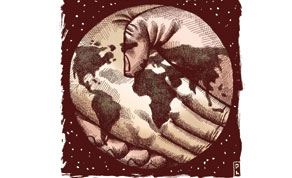By Jagdish Bhagwati/New York
The Doha Round, the latest phase of multilateral trade negotiations, failed in November 2011, after 10 years of talks, despite official efforts by many countries, including the United Kingdom and Germany, and by nearly all eminent trade scholars today.

While trade officials in the United States and the European Union blamed the G-22 developing countries’ excessive demands for the failure of earlier negotiations in Cancun in 2003, there is general agreement that this time it was the US whose unwarranted (and unyielding) demands killed the talks. So, now what?
The failure to achieve multilateral trade liberalisation by concluding the Doha Round means that the world lost the gains from trade that a successful treaty would have brought. But that is hardly the end of the matter: the failure of Doha will virtually halt multilateral trade liberalisation for years to come.
Of course, multilateral trade negotiations are only one of three legs on which the World Trade Organisation stands. But breaking that leg adversely affects the functioning of the other two: the WTO’s rule-making authority and its dispute-settlement mechanism. The costs here may also be large.
Until now, preferential trade agreements (PTAs) among small groups of countries co-existed with multilateral, non-discriminatory trade-liberalisation rounds. As a result, the rules that govern trade, such as anti-dumping duties and countervailing duties to offset illegal subsidies, were in the domain of both the WTO and the PTAs.
But, when there was a conflict, WTO rules prevailed, because they conferred enforceable rights that extended to all WTO members, whereas PTA-defined rights extended only to the PTA’s few members.
So, while powerful, “hegemonic” countries like the US managed to impose their own rules on weaker partners in the PTAs that they helped to proliferate, big emerging economies like India, Brazil, China, and South Africa insisted on rejecting such demands when made as part of multilateral trade rounds like Doha.
Now, however, with the era of multilateral trade rounds and system-wide rules behind us, the PTAs are the only game in town, and the templates established by the hegemonic powers in unequal trade treaties with economically weaker countries will increasingly carry the day. In fact, such templates now extend beyond conventional trade issues (for example, agricultural protection) to vast numbers of areas unrelated to trade, including labour standards, environmental rules, policies on expropriation, and the ability to impose capital-account controls in financial crises.
The US-led public-relations blitzkrieg of euphemism has already begun, with US assistant trade representative Wendy Cutler describing the latest PTA, the Trans-Pacific Partnership, as a “high standard” agreement.
Other American officials have taken to calling PTA’s “trade agreements for the twenty-first century”. Who could possibly be against the twenty-first century?
What is disturbing is the way in which some trade economists in Geneva and in Washington have capitulated to such propaganda, and regard capitulation by the WTO as a way to “salvage” and reshape the organisation. The WTO, like a village during the Vietnam War, must be destroyed in order to be saved.
Unfortunately, this insidious attack on the second leg of the WTO also extends to the third leg, the dispute-settlement mechanism. The DSM is the pride of the WTO: it is the only impartial and binding mechanism for adjudicating and enforcing contractual obligations defined by the WTO and accepted by its members. It gives every member, big or small, a platform and a voice.
Once PTA-based DSMs are established, however, adjudication of disputes will reflect asymmetries of power, benefiting the stronger trade partner. Moreover, third countries will have little scope for input into PTA-based DSMs, though their interests may very well be affected by how adjudication is structured.
Given that the US has abandoned any pretense of leadership on world trade, it is up to major emerging economies and like-minded developed countries to establish their own template, one that adheres to trade objectives and discards what special-interest lobbies in hegemons like the US seek to foist on PTAs. This is exactly what India has done with the EU, which is now stripping such features out of its proposed PTA.
Other countries – Brazil, South Africa, and China among the major emerging economies, and Japan and Australia among the developed countries – should back such “garbage-free” PTAs as well.
That just might be an adequate rebuff to the rise of PTAs whose main objective is to serve hegemonic interests alone – perhaps even sufficient to get the multilateral approach back on track. - Project Syndicate
l Jagdish Bhagwati, professor of economics and law at Columbia University and senior fellow in International Economics at the Council on Foreign Relations, was the co-chair of the High-Level Trade Experts Group appointed by the British, German, Indonesian, and Turkish governments.

